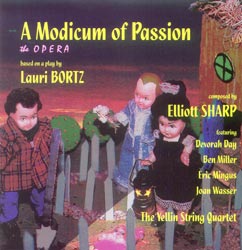|
Heard In
Reviews of artist releases:
cd's, books, magazines, &c.
Lauri Bortz/Elliott Sharp
One Thousand Minds/A Modicum of Passion
(Abaton Book Company)
review by Florence Wetzel
2006-02-28

Abaton Book Company has carved a niche for itself by offering high-quality music by a unique roster of talents. Their latest CDs give a sense of Abaton's range: One Thousand Minds by Veena Sahasrabuddhe, and the opera A Modicum of Passion, based on a play by Bortz with music composed by the redoubtable Elliott Sharp.
Sahasrabuddhe is one of the premiere Hindustanti (i.e., North Indian) classical singers. Now in her fifties, she has performed worldwide for decades and appeared on over forty recordings for labels such as HMV and Sony, and she's also been honored prodigiously in her native India. Incredibly, One Thousand Minds is Sahasrabuddhe's first American release, and Abaton has done a wonderful job of presenting her work. Mention must be made of the packaging: there's a bilingual lyric sheet as well as a twenty-page photo journal of Sahasrabuddhe's musical journey, all presented in a five-inch audio reel box with glowing artwork by Marianne Nowottny.
The music itself is enchanting. Sahasrabuddhe's voice is an incredible combination of ecstasy and discipline, creating hypnotic music that is utterly timeless. The CD has three songs: the 42-minute "Raga Kalavati", the 18-minute "Alap in Raga Shree", and the three-minute "Vande Mataran". The different songs lengths give a nice sense of Sahasrabuddhe's breadth as well as her passionate elegance. The musicians on the CD - Sanjay Deshpande on tabla, Dr. Sudhanshu Kulkarni on harmonium, and Jayanti Sahasrabuddhe (her daughter-in-law) on tanpura and vocal support - are also impressive. All three play with great feeling, and they set up a wealth of mesmerizing rhythms that give Sahasrabuddhe room to fly.
Sahasrabuddhe's father studied with the eminent Indian musician Pandit Vishnu Digambar Paluskar, who felt that music was a path to God-realization and could not be divorced from moral commitment. One feels this influence in One Thousand Minds, a CD that transports as well as pleases.
A Modicum of Passion is a deliciously creepy opera billed as "a woeful tale of depraved indifference." The story takes place in an unwholesome future (in Connecticut, no less) where men only wed men, and women are relegated to breeding babies and housekeeping. A male couple adopts a baby, but when they discover it's a girl they put the baby outside to freeze. One of the men takes pity on the baby and brings it back to its mother so it can be fed, but despite their best efforts the baby is dead by morning. Undaunted, the couple determines to try again, and willingly decide to adopt another girl.
The opera's vision is chilling, but at the same time there's lots of buoyant black humor - think Eraserhead meets A Handmaid's Tale. Bortz's libretto is full of engaging dialogue, and Sharp's darkly melodic compositions complement the story beautifully. Also the actors are wonderful, playing their parts with energy and aplomb. It's an all-star cast composed of R&B crooner Eric Mingus, punk prince Ben Miller, indie rockette Joan Wasser, and jazz maestress Devorah Day. The Yellin String Quartet-Garo Yellin on cello, Amy Kimball on violin, Conrad Harris on violin, and Stephanie Griffin on viola-provide excellent accompaniment and bring life to Bortz and Sharp's conception.
Comments and Feedback:



More Recent Reviews, Articles, and Interviews @ The Squid's Ear...


|
|
|
|

